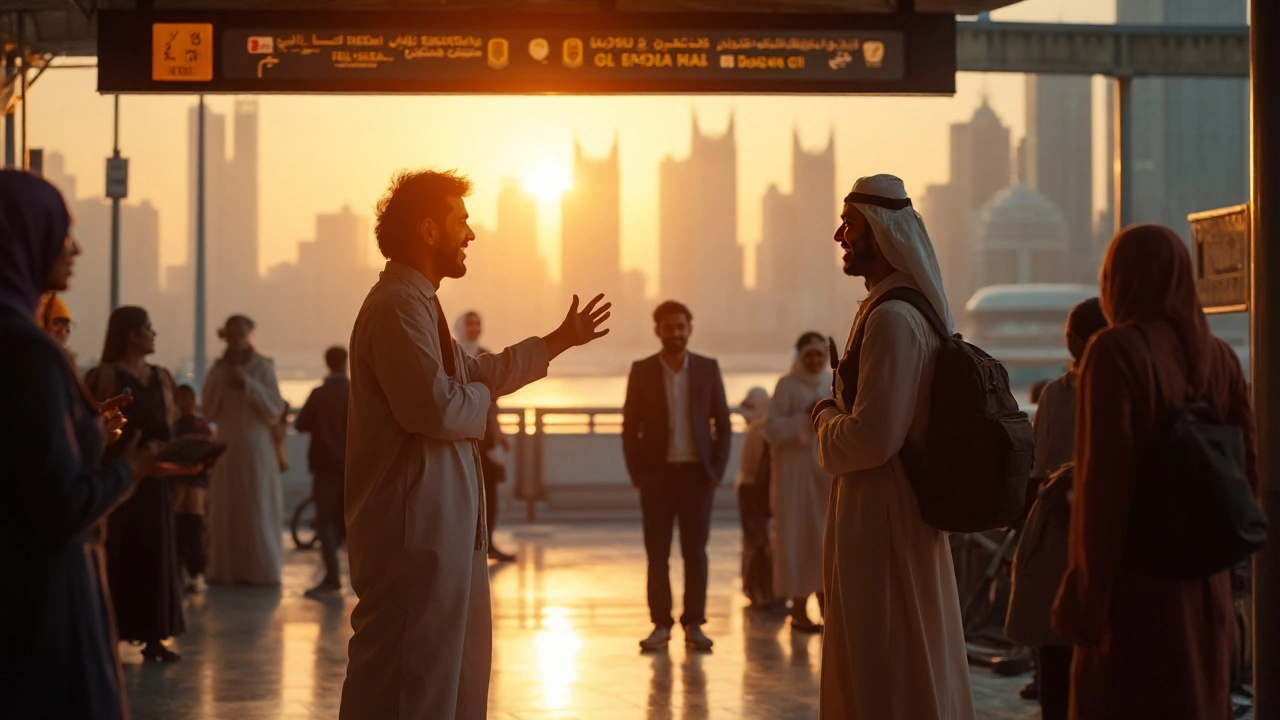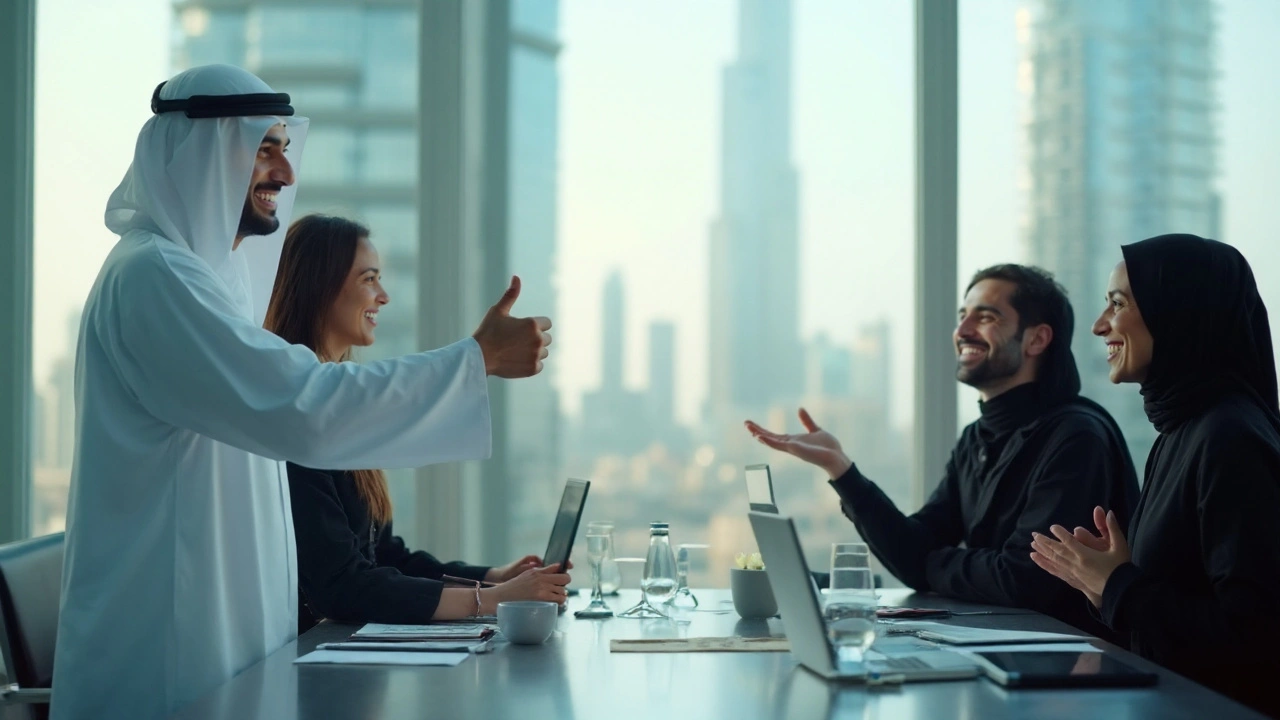You’ve probably heard a scary rumor: a thumbs-up is offensive in “the Middle East.” Then you’re about to land in Dubai, jet-lagged, trying not to mess up a simple thank-you. Here’s the straight answer for 2025: in Dubai, a thumbs-up is widely understood as “good/okay” and is rarely offensive-especially in casual, multicultural settings. The nuance lives in context, not the gesture itself.
- TL;DR: In Dubai, thumbs-up is commonly positive and usually safe. It can feel rude only in tense moments or ultra-formal settings.
- Use words first in business or with elders; pair gestures with a smile. Keep hands calm if emotions run high.
- Right-hand rule: offer items or signals with your right hand. It’s a courtesy more than a rigid law.
- Obscene or aggressive gestures are illegal under UAE law; don’t gesture while angry-ever.
- Safer defaults: say “shukran” (thank you), “tayyeb” (okay), or give a small nod.
What a thumbs-up means in Dubai today
Dubai isn’t a cultural monolith; it’s a 200+ nationalities kind of city. In that mix, the thumbs-up has settled into a plain, positive signal. Taxi drivers flash it through the rear-view mirror, baristas use it when your name is tricky to pronounce, and construction crews use it across language gaps. Among younger Emiratis and the general expat crowd, it reads as “yes/okay/great.”
So where did the myth come from? In parts of Iraq, Iran, and Afghanistan, an emphatic thumbs-up historically carried an obscene meaning. That story traveled-then got pasted onto the whole region. The UAE’s reality is different. Dubai’s multicultural environment means gestures that help people cooperate get normalized quickly. You’ll see thumbs-up in malls, on job sites, and at events-harmless, friendly, and constant.
That said, context matters. In very formal business rooms, thumb signs look a bit casual. With elders or in religious spaces, subtlety beats theatrics. The gesture itself isn’t the problem; tone and timing are.
Legal reality also matters. The UAE takes public decency seriously. Obscene or insulting gestures-like the middle finger or anything clearly aggressive-can be punished under UAE Federal Decree-Law No. 31 of 2021 (Penal Code). Dubai Police have repeatedly warned drivers about offensive hand signals during traffic disputes, which have led to fines and, in some cases, prosecutions. A gentle thumbs-up isn’t in that category. But a jabby, confrontational thumbs-up-accompanied by angry words-can be read as insult. When stress climbs, keep your hands still.
Quick gut-check: If you’d flash the gesture to a barista in Auckland or London and feel fine about it, you’ll be fine in Dubai. If you’re heated and your heart’s racing, park the hands and use calm words.
When a thumbs-up can backfire
It’s rare, but here are the edge cases. Think of them as “don’t add flame to a spark.”
- In an argument (traffic, queues, disputes): Any gesture can escalate. Even a “cool” thumbs-up can feel sarcastic. Keep hands down, breathe, use a neutral “okay” and step away.
- Ultra-formal business settings: In a boardroom with senior Emirati leaders or government officials, go verbal: “Agreed,” “Understood,” or “Shukran.” Save gestures for lighter moments.
- Religious contexts: In mosques or Islamic classes, rely on quiet words and nods. Keep nonverbal signals minimal.
- With elders: Many elders won’t be offended; some may just find it a bit informal. Add a smile and a word like “shukran” and you’re solid.
- Left-hand overuse: It’s not a crisis, but etiquette in the Gulf favors the right hand for giving, greeting, and signaling approval. If you can, switch to the right. If you slip, don’t panic-correct and move on.
Use this quick mental model (I call it the “Triangle Test”):
- Seniority: The more senior the person, the more verbal and contained you should be.
- Setting: The more formal or sacred the setting, the smaller your gestures.
- Stress: The higher the emotion, the less you should gesture at all.
If two sides of the triangle are “high,” go words-only. If all three are high, step back and cool off.

Safer alternatives, quick scripts, and a handy cheat sheet
Want zero risk? Choose words. Arabic is welcomed, English is widely understood, and simple phrases go far.
Say this instead
- “Shukran” = Thank you
- “Tayyeb” or “Okay” = Okay/fine
- “Naam” = Yes
- “La, shukran” = No, thank you
- “Afwan” = You’re welcome / Sorry (context-dependent)
Pair a soft smile with a small nod. That combo is universal in Dubai’s service settings.
Micro-rules that work
- Right-hand rule: Offer approval and pass items with your right hand when you can.
- Three-second cool-off: If you’re upset, count to three and keep your hands still.
- Words-first in business: Speak your agreement, then add a small nod. Gestures are optional.
- Keep it low and small: Big, high gestures can read as attention-seeking.
- Smile beats symbols: A warm smile carries the message without culture-specific risk.
Common gestures in Dubai, at a glance
| Gesture | Meaning in Dubai (2025) | Risk Level | Safer Alternative | Notes |
|---|---|---|---|---|
| Thumbs-up | Yes/okay/good | Low | Say “tayyeb” + nod | Fine casually; keep it small in formal rooms |
| Open hand, palm up | Please/after you | Low | Small nod | Polite for gestures like “go ahead” |
| Pointing with index finger | Directing attention | Medium | Open hand gesture | Can feel sharp; open-hand indicates respect |
| Beckoning, palm up | Come here | Medium | Palm down, small wave | Palm-up beckoning can read as bossy |
| Showing soles of feet | Relaxed but careless | Medium-High | Cross legs low | Avoid pointing soles directly at people in formal contexts |
| “OK” ring (thumb + forefinger) | Okay/fine | Low-Medium | Verbal “okay” | Generally understood; avoid exaggerated versions |
| Middle finger or obscene gestures | Insult | Very High | Hands down | Illegal; can lead to fines, deportation, or jail |
Real-world examples
- Café pickup: Barista calls your name. You smile, give a small thumbs-up, and say “shukran.” Perfect.
- Taxi confirmation: Driver asks, “This location okay?” You say “tayyeb” with a nod. If you’re holding a bag, a tiny thumbs-up is fine.
- Boardroom: Senior official asks if the timeline works. You say, “Yes, that works-thank you,” and nod. Skip the gesture.
- Mosque tour: Guide asks if you’re ready to move on. Quiet “okay” and a nod. Save the gestures for outside.
- Traffic flare-up: Someone cuts you off. Hands on the wheel, no gestures. You do not want a complaint on file.
Quick answers and what to do if you slip
Here are the follow-ups most people ask after Googling “thumbs up rude in Dubai.”
Mini-FAQ
- Is a thumbs-up rude in Dubai? No. It’s commonly positive and widely used. The risk is in heated situations or overly casual use with seniors in formal rooms.
- Should I avoid it with Emiratis? Not necessarily. Use it casually with a smile. In formal meetings with elders or officials, go verbal and keep gestures small.
- Can I use my left hand? If your right hand is full, no one will gasp. Still, use your right hand when it’s easy-it reads as thoughtful.
- Is the “OK” sign safe? Generally yes. But in very formal settings, words are cleaner.
- What’s actually illegal? Obscene or insulting gestures-especially in traffic or disputes. UAE Public Prosecution and Dubai Police periodically warn about this, and cases have been prosecuted under the Penal Code.
- How about other Gulf countries? In the UAE, thumbs-up is fine. In some neighboring regions (Iraq, Iran, Afghanistan), historical meanings were harsher. If you’re traveling beyond the UAE, recheck etiquette.
If you think you offended someone
- Freeze the hands. Don’t add more signals.
- Offer a quick, genuine apology: “Sorry,” or “Afwan.”
- Pair it with a small nod and neutral tone. No explanations needed.
- If it’s at work, follow up with a polite message: “Appreciate the meeting-thank you for your time.”
- If things escalate in public, disengage. Let it go; Dubai values calm more than winning the moment.
Business etiquette at a glance
- Start meetings with a verbal greeting; handshakes only if offered (especially across genders-let Emirati women lead).
- Speak your agreement; a subtle nod is enough. Save thumbs-up for informal moments.
- Keep your soles pointed away from people. Sit upright in senior meetings.
- Dress a notch more formal than you think. Understated beats flashy.
Heuristics you can use anywhere in Dubai
- Words-first rule: If you can say it, say it.
- Small is safe: Small gestures, small smiles, small nods.
- Right-hand courtesy: Offer, receive, and signal with your right when practical.
- Cool-down protocol: No gestures when you’re mad. Ever.
Why trust this? Government guidance backs the legal piece (UAE Federal Decree-Law No. 31 of 2021; Dubai Police warnings about offensive gestures while driving). On the ground, hospitality and service workers in Dubai rely on thumbs-up daily because it solves language gaps fast. When courtesy and calm frame the gesture, it lands as intended.
Next steps
- Practice the basics: “Shukran,” “Tayyeb,” and a small nod.
- Use thumbs-up casually, not performatively.
- In formal meetings, lead with words; mirror the room’s tone.
- In any conflict, keep your hands neutral.
That’s all you need. If you’re polite, you’ll be fine. And if you’re like me-writing this from a windswept Wellington kitchen while a cat named Whiskers insists on napping across the keyboard-remember: the point isn’t to be perfect. It’s to be kind, clear, and calm. Dubai responds well to all three.
Escort Dubai